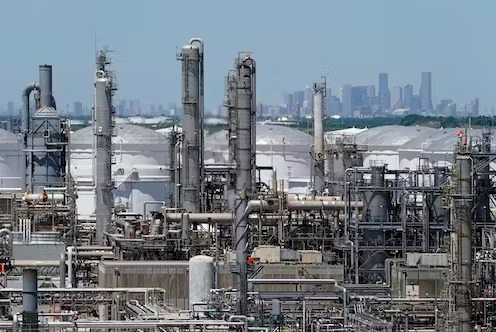Oil prices edged higher in Asian trading on Thursday, recovering slightly from sharp losses as traders assessed escalating U.S.-China trade tensions and surging U.S. crude stockpiles.
At 20:51 ET (01:51 GMT), Brent crude futures rose 0.2% to $74.75 per barrel, while WTI crude futures for March delivery increased 0.2% to $70.91 per barrel. This follows a 2% decline on Wednesday, with prices down 3.5% for the week, weighed by weak demand signals.
The White House’s 10% tariff on Chinese imports and Beijing’s retaliatory duties on U.S. crude, LNG, and coal have raised concerns over global oil demand. China, a major importer of American crude, had been purchasing about 1 million barrels per day, but the new tariffs could disrupt trade flows. Meanwhile, the U.S. tightened sanctions on Iran, aiming to reduce its oil exports to zero. Although this could limit global supply, its effect is being overshadowed by demand concerns.
Adding to bearish sentiment, U.S. crude inventories surged by 8.7 million barrels last week, significantly exceeding analysts’ expectations of a 2.4 million barrel increase, according to the U.S. Energy Information Administration (EIA). Higher inventories indicate supply is outpacing consumption, pressuring oil prices further.
Gasoline stocks also climbed, while distillate inventories declined, signaling sluggish demand in the petroleum sector. Prices hit their lowest settlement of the year on Wednesday, reflecting a complex mix of supply constraints and demand uncertainties.
Analysts suggest continued volatility as traders weigh trade policies, inventory data, and broader economic conditions affecting global oil markets.



 Trump Endorses Japan’s Sanae Takaichi Ahead of Crucial Election Amid Market and China Tensions
Trump Endorses Japan’s Sanae Takaichi Ahead of Crucial Election Amid Market and China Tensions  India–U.S. Interim Trade Pact Cuts Auto Tariffs but Leaves Tesla Out
India–U.S. Interim Trade Pact Cuts Auto Tariffs but Leaves Tesla Out  Oil Prices Slide on US-Iran Talks, Dollar Strength and Profit-Taking Pressure
Oil Prices Slide on US-Iran Talks, Dollar Strength and Profit-Taking Pressure  Russian Stocks End Mixed as MOEX Index Closes Flat Amid Commodity Strength
Russian Stocks End Mixed as MOEX Index Closes Flat Amid Commodity Strength  Singapore Budget 2026 Set for Fiscal Prudence as Growth Remains Resilient
Singapore Budget 2026 Set for Fiscal Prudence as Growth Remains Resilient  Trump Lifts 25% Tariff on Indian Goods in Strategic U.S.–India Trade and Energy Deal
Trump Lifts 25% Tariff on Indian Goods in Strategic U.S.–India Trade and Energy Deal  RBI Holds Repo Rate at 5.25% as India’s Growth Outlook Strengthens After U.S. Trade Deal
RBI Holds Repo Rate at 5.25% as India’s Growth Outlook Strengthens After U.S. Trade Deal  Trump Signs Executive Order Threatening 25% Tariffs on Countries Trading With Iran
Trump Signs Executive Order Threatening 25% Tariffs on Countries Trading With Iran  China Extends Gold Buying Streak as Reserves Surge Despite Volatile Prices
China Extends Gold Buying Streak as Reserves Surge Despite Volatile Prices  Silver Prices Plunge in Asian Trade as Dollar Strength Triggers Fresh Precious Metals Sell-Off
Silver Prices Plunge in Asian Trade as Dollar Strength Triggers Fresh Precious Metals Sell-Off  Japan Economy Poised for Q4 2025 Growth as Investment and Consumption Hold Firm
Japan Economy Poised for Q4 2025 Growth as Investment and Consumption Hold Firm  South Korea Assures U.S. on Trade Deal Commitments Amid Tariff Concerns
South Korea Assures U.S. on Trade Deal Commitments Amid Tariff Concerns  Gold and Silver Prices Slide as Dollar Strength and Easing Tensions Weigh on Metals
Gold and Silver Prices Slide as Dollar Strength and Easing Tensions Weigh on Metals  Dollar Steadies Ahead of ECB and BoE Decisions as Markets Turn Risk-Off
Dollar Steadies Ahead of ECB and BoE Decisions as Markets Turn Risk-Off  U.S. Stock Futures Slide as Tech Rout Deepens on Amazon Capex Shock
U.S. Stock Futures Slide as Tech Rout Deepens on Amazon Capex Shock  U.S.-India Trade Framework Signals Major Shift in Tariffs, Energy, and Supply Chains
U.S.-India Trade Framework Signals Major Shift in Tariffs, Energy, and Supply Chains  Global Markets Slide as AI, Crypto, and Precious Metals Face Heightened Volatility
Global Markets Slide as AI, Crypto, and Precious Metals Face Heightened Volatility 































